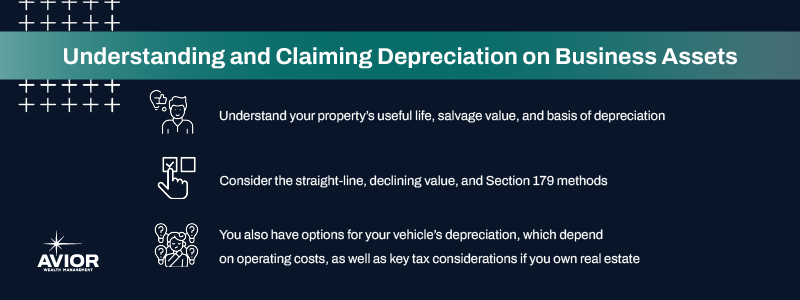Understanding and Claiming Depreciation on Business Assets
Learn the different depreciation methods to consider for your business property and what common terms refer to when you’re assessing tax implications

Preparing for taxes is a big concern for your business all year. One factor that deserves careful attention is the depreciation of your business assets, such as vehicles, equipment, and property. The IRS has requirements in place regarding depreciation, and understanding these rules allows you to maximize tax benefits.
This guide covers all the basics of depreciation and explains how to claim it properly on your business assets.
The basics of depreciation for business owners
Depreciation is an accounting concept that reflects the gradual decrease in the value of an asset over time. Assets experience this decline because of wear and tear, fading usefulness, or aging. Even though the asset itself may lose value, its cost is spread out over its useful life, allowing businesses to allocate the expense across multiple years.
This helps you accurately represent the true cost of using the asset over its expected lifespan. Depreciation is applicable to various types of assets you may need for your business, including machinery, buildings, technology, and vehicles.
A few other terms to know related to depreciation:
- Useful life: The IRS states that depreciable property must have a useful life, meaning it is “something that wears out, decays, gets used up, becomes obsolete, or loses its value from natural causes.”
- Salvage value: This is the estimated amount that you think the asset would get if you sold it when its useful life ends.
- Basis of depreciation: The depreciation basis represents the amount of an asset’s cost that can be depreciated over time.
Additionally, you can only depreciate property on your taxes if it meets these requirements:
- You own the property.
- You use it for your business or “income-producing activity.”
- It has a useful life.
- It is expected to last more than a year.
- It is not an excepted property as listed by the IRS, including intangible property, capital improvement equipment, and others.
Understanding these details fully will help you factor in depreciation for each of your qualifying business assets.
Methods of depreciation
It’s important to identify how you want to claim depreciation on your assets based on your business goals and financial situation. Usually, you can’t take a complete deduction for the asset the same year it was acquired if it’s a capital expenditure.
The main methods of depreciation are straight-line, declining balance, and Section 179:
- Straight-line: The straight-line method is simple, so many small businesses use it. You simply spread out the asset’s value so that the depreciation amount is the same each year.
- Declining balance: This method is best employed when the asset loses more value in its first years than later years. For example, because new technology is introduced every year, a laptop or smartphone may lose the most value in the initial years.
- Section 179: This refers to Section 179 of the Internal Revenue Code, which allows your business to take a deduction for qualifying depreciable assets the year they’re put into service, up to a certain limit. The benefit of this is that you can lower your tax liability now instead of depreciating the asset over time.
Discuss these options with your financial advisor and align your method with your other tax planning strategies and priorities.
Vehicle cost deductions and depreciation
You can deduct vehicle expenses in one of two ways. You can either follow the standard mileage rate or use the actual cost method. Typically, the higher the vehicle’s operating costs, the more value you’ll get from going with the actual cost.
With the standard mileage rate method, you just track your business-related miles and use the IRS standard mileage rate when filing your taxes—which for 2024 is $0.655. To use this method, you must choose it in the first year you use the car for your business, though you can change the actual cost later.
With the actual expense method, you track all business-related vehicle expenses, including vehicle depreciation, and deduct them as business expenses. The percentage of your vehicle use for business purposes determines how much you can deduct.
Vehicles have special requirements for depreciation. You typically can’t deduct the full cost in the same year you purchase the vehicle. For 2024, the amount you can write off in the first year is $12,400, plus $8,000 in bonus depreciation.
How to depreciate real property
Depreciating real property, including both residential and commercial properties, involves applying specific rules and considerations. Residential properties are generally depreciated over 27.5 years at a rate of 3.636%. The straight-line method is typically used, spreading the cost evenly over the property’s useful life.
Commercial properties are typically depreciated over 39 years for tax purposes. The straight-line method is commonly used for commercial real estate as well.
In addition, bonus depreciation is a tax incentive that allows you to deduct a substantial percentage of the cost of qualifying property in the year you place it in service. This provides immediate tax benefits and potentially improves cash flow. While bonus depreciation can provide tax advantages, there are considerations, such as the impact on depreciation recapture when the property is sold.
Leveraging depreciation for business growth
Understanding how depreciation works will help you apply the benefits to your business taxes. Remember that keeping adequate, detailed records is key, so you have all the documentation you need for accurate depreciation.
Going over your options for depreciation and how to properly claim it is made easier with a financial professional by your side. At Avior Wealth Management, we help you decipher and claim depreciation on your business property and equipment to get the most out of your tax breaks.
Work with the Avior team today to maximize your business deductions and credits and minimize your tax liability.
Disclaimer: Nothing contained herein should be construed as legal or tax advice. Avior and our Advisors will work with your attorney and/or tax professional to assist with your legal and tax strategies. Please consult your attorney or tax professional with specific legal and/or tax questions. Investment Management and Financial Planner are offered through Avior Wealth Management, LLC, an SEC-registered investment advisor. Past performance is not a guarantee of future results. Investments are subject to loss, including the loss of principal.
No Comments
Sorry, the comment form is closed at this time.




